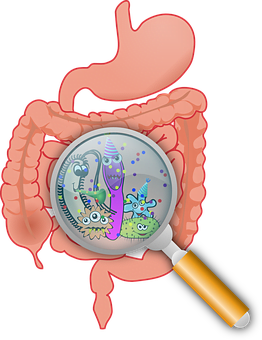Microbiome
Two kilograms of microorganisms
Did you know that you carry a total of around two kilograms of microorganisms inside you? What doesn’t sound very pleasant at first glance is actually essential for survival! Every surface of your body that comes into contact with the outside world is colonised with them. However, the majority of microorganisms live in the intestine. It is estimated that there are around 100 trillion of them, belonging to up to 1000 different species. We have considerably more of these microorganisms than we have cells. In the past, these bacteria, fungi, etc., which work together in symbiosis and are extremely important for the organism, were called the intestinal flora. The newer name, however, is microbiome(micro, Greek for small, bio , Greek for life, with the ending -om, community of life)

An organ of its own?
Some scientists even call the microbiome an organ, which illustrates the importance of the bacteria. A person’s microbiome changes throughout their life and, like their fingerprint, its composition is different for everyone. People who live closely together have a more similar microbiome than strangers. One could therefore also say that the microbiome is inherited. About 40 % of the microorganisms are actually part of the basic make-up. Researchers have been able to show, for example, that at birth some of the bacteria in the birth canal are passed on from mother to baby. The rest is influenced by various factors, such as diet and lifestyle, but also contact with diseases, etc. Research on the microbiome is still relatively young, but more interesting details are constantly coming to light. For example, we now know that the microbiome is interrelated with many bodily functions. Probably the best known is its importance for digestion. Microorganisms can utilise certain components of food that would otherwise be indigestible. So they are important for good digestion.

Connection with the immune system
But the microbiome also plays a very important role for the immune system. The developing microbiome contributes to the formation of the immune system. The microbiome establishes itself within the first years of life. Our adaptive (learned) immune system is trained when we come into contact with a wide variety of microorganisms. The adaptive immune system thus learns how to react to microbes and defends the body against pathogenic organisms. It takes these first years of life to reach a certain stability and diversity. However, especially in the first three years of life, numerous environmental influences (e.g. nutrition, diseases, antibiotic therapies, etc.) can sometimes lead to permanent microbiome shifts with consequences for health. Even in adulthood, the microbiome is a dynamic system, it constantly adapts to changing factors and is influenced by them (e.g. type, amount and timing of daily food, medication, etc.). Thus, the microbiome can be supported by an adapted diet, but can be disturbed after taking antibiotics (the microbiome needs several months to regenerate afterwards)

Intestinal barrier
The microbiome is one of the three levels of the so-called intestinal barrier. To prevent harmful bacteria from entering the body, the microbiome forms together with the mucous membrane and the intestine-associated immune system forms a three-stage chain of defence. With its enormous surface area of approx. 400 m², our intestine is the largest interface with the outside the largest interface with the outside world. This is where the absorption of vital nutrients Nutrients from our food takes place and everything is first subjected to strict Control. That is why we also find 80% of our immune cells in the intestine, which support us whenever it becomes necessary.
The brain in the gut
The microbiome can also influence the brain, via the so-called gut brain axis. Some scientists therefore call it the “second brain”. The gut and brain communicate with each other through nerves, hormones, white blood cells and immune substances. Small molecules released by the activity of intestinal bacteria trigger reactions of the nerves in the gastrointestinal tract. For example, it is known that a large part of serotonin (neurotransmitter of the brain) is produced in special cells of the small intestine. It is similar with other neurotransmitters; around 30 neurotransmitters are produced in the intestine. If production is disturbed, this can lead to sleep problems, anxiety and depressive moods. From this, links between the microbiome and various brain disorders such as depression or AD(H)S and autistic spectrum disorders can be deduced.
Hippocrates already said: “The healthy intestine is the root of all health”
Hippocrates